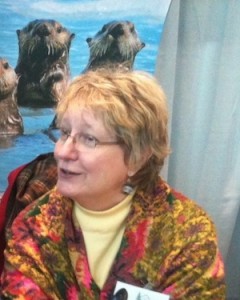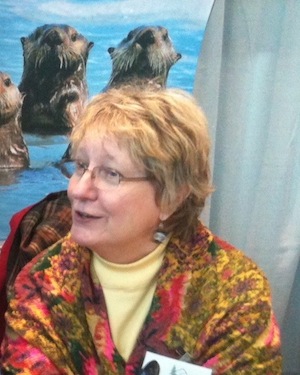Brokenness and Blessing in the Bayou: The Real-Life Impacts of Climate Change – Kristina Peterson
 Over the past 12 years, my call in ministry has been to the bayous of Louisiana, home to communities that have undergone hurricanes, oil spills, economic losses from imported seafood, and the splintering of extended families. This is a region that constantly draws upon its resources of family, faith, and culture to endure endless hardships. It is within that context that I pastor a bayou congregation and do community based action research with coastal communities.
Over the past 12 years, my call in ministry has been to the bayous of Louisiana, home to communities that have undergone hurricanes, oil spills, economic losses from imported seafood, and the splintering of extended families. This is a region that constantly draws upon its resources of family, faith, and culture to endure endless hardships. It is within that context that I pastor a bayou congregation and do community based action research with coastal communities.
The work we have done over the past years includes ethnobotany, food sovereignty and security initiatives, cultural reinvigoration, employing historical methods of resilience, and forming various collaborations to address emerging issues. Our strategies for addressing these issues have to be as fluid as the changing complexities of the problems and as persistent as the ever-rising water. That rising water is challenging our imaginations as we wrestle with how to relocate an entire community and still retain the community’s tie to subsistence livelihoods. Creativity and faith are at the core of these people’s hearts as they refuse to give up on God’s splendid handiwork in creation.
Why is it so challenging? As a colleague of mine puts it, the slow-onset disaster of land loss due to climate change results in the continual layering of many types of disasters, one upon another, in Coastal Louisiana. Nothing is neat about what is happening. Even as they seek to mitigate losses due to stronger hurricanes, communities also have to look at other adaptation measures due to changes in land and water patterns. The subsidence of land has left many more communities susceptible to storm surges and thus the loss of home, churches, schools, stores, and other vital services. The social structures that sustain a community are abandoning the bayous with each storm.
Why is this happening? Louisiana’s delta region is the fastest-disappearing land in the world due to the rising sea level and the resulting land subsidence. The complexity of rapid land loss and its multiple causes makes it difficult to find political, economic, and/or social middle ground to address this ecological and social disaster.
The bayous of the delta region are a critical part of the larger web of life that serves ecological needs such as breeding grounds and homes for the Gulf of Mexico marine life, as well as carbon sinks and ‘refueling’ grounds for migratory birds. The disappearing delta is also home to centuries-old human communities that are unique, vibrant, and resilient. However, all the resilience in the world cannot make up for the extreme loss of land and salt-water intrusion.
The whole of creation is crying out in anguish with this loss of place. It is not just the people or the creatures of land, sea, and air in Louisiana that are impacted by this massive loss; it is the whole of creation. I even believe I hear the Creator God crying out. You see, the loss of birds will affect agriculture in the mid-west, the loss of estuaries will impact the sea creatures of both the Gulf and the Atlantic, the loss of wetlands will increase temperatures globally, and the loss of land will create several million climate refugees in the near future.
The silence over the loss of the Louisiana delta is a moral and ethical outrage. It is an issue of social and environmental justice, and the two cannot be separated. The loss of delta land demands our ardent prayers for healing and our passion to address both immediate and long-term needs. To that end, the Presbytery of South Louisiana brought an overture to the General Assembly of the Presbyterian Church (USA) in 2012 to specifically address the issues of the disappearing delta/wetland region and for the establishment of the Wetlands Theological Education Project in the Presbytery of South Louisiana. Bayou Blue Presbyterian Church has been a leader in the efforts to educate volunteers who come to work in the area to work on the importance of the wetlands. The Bayou Blue congregation and the Wetlands Theological Education Project support the communities closest to the Gulf with projects and programs that address immediate and long-term needs including disaster recovery, food sovereignty, and the application of Traditional Ecological Knowledge (TEK). Through hospitality dinners and the work of Young Adult Volunteers (YAVs), the congregation is working nationally and internationally to draw attention to critical nature of the issues facing the Louisiana coast. One of many goals is to have the Louisiana delta region be recognized by the United Nations Ramsar Accord.
It is important to understand that the communities that are most vulnerable were not initially built in risky areas. They have become vulnerable due to the destruction of wetlands and coastal forests. The Gulf has encroached upon once-inland bayou communities such as Cocodrie, Dulac, Isle de Jean Charles, Jean Lafiite and Grand Bayou. For generations, these communities were self-sufficient, operating an economy based on non-exploitative, sustainable subsistence seafood extraction and gardening.
Today, the seafood that had sustained these communities has been affected by the BP oil disaster, and their gardens and orchards are suffering from salt-water intrusion. The people of the coastal fishing communities are creative, hard-working, and resilient people. While watching their land subside the communities are taking multiple proactive approaches to address this problem. They understand their commitment to restoring sustainable and resilient wetlands is not just economic or social; it is deeply religious.
As in any eco-system that experiences rapid regime change, some organisms disappear while new ones take their place. The plants that are disappearing from the bayou used to serve as valuable sources of food and healing tinctures for the local communities and wildlife. In the face of such a loss, many communities are working to save and, where possible, reintroduce native plants and wildlife into their original habitats. Alongside this work, community members are also conducting ethnobotany studies that will help identify plants at risk and prevent their extinction from climate change. Many of these so-called ‘wild’ plants are highly nutritious and have a wide variety of uses – from serving medicinal purposes to providing for migratory birds. This type of work helps transmit Traditional Ecological Knowledge within the community and helps inform those on the outside about the importance of protecting specific areas from subsidence.
In another community strategy for adaptation, Grand Bayou has installed 4-to-5-foot high garden containers in bayou areas subject to frequent salt-water surges. These container gardens permit water to flow both vertically and horizontally so that salt is washed away with rain. They serve to feed the community as well as to preserve historic seeds.
To further their agricultural and fishing livelihoods, people from the numerous native coastal communities have formed the First People’s Conservation Council (FPCC), which works collaboratively with the Natural Resource Conservation Service (NRCS) of the U.S. Department of Agriculture. The FPCC provides individual communities the opportunity to share knowledge, skills, key issues, and ideas for restoration and retention of the wetlands. Through collaboration with the NRCS, communities are discovering new resources for creatively addressing their need for food independence and sovereignty. Even as the global community continues to contribute to and even debate the reality of climate change, these bayou communities are seeking to nurture a healthy and spiritually sound future in the midst of the climate change that for them is a daily reality.
This is an amazing place to be and an amazing movement of which to be a part. I invite you to come on down to the bayou and ‘pass a good time.’ You will be blessed.
Kristina Peterson is an anthropologist, coastal researcher, and the Pastor of Bayou Blue Presbyterian Church in Gray, Louisiana. She worked with her congregation and presbytery 3 years ago to facilitate 2 overtures to the General Assembly of the PC(USA) related to loss of coastal wetlands and the BP oil spill. In 2010, she received the William Gibson Award for Individual Leadership in Environmental Justice.

